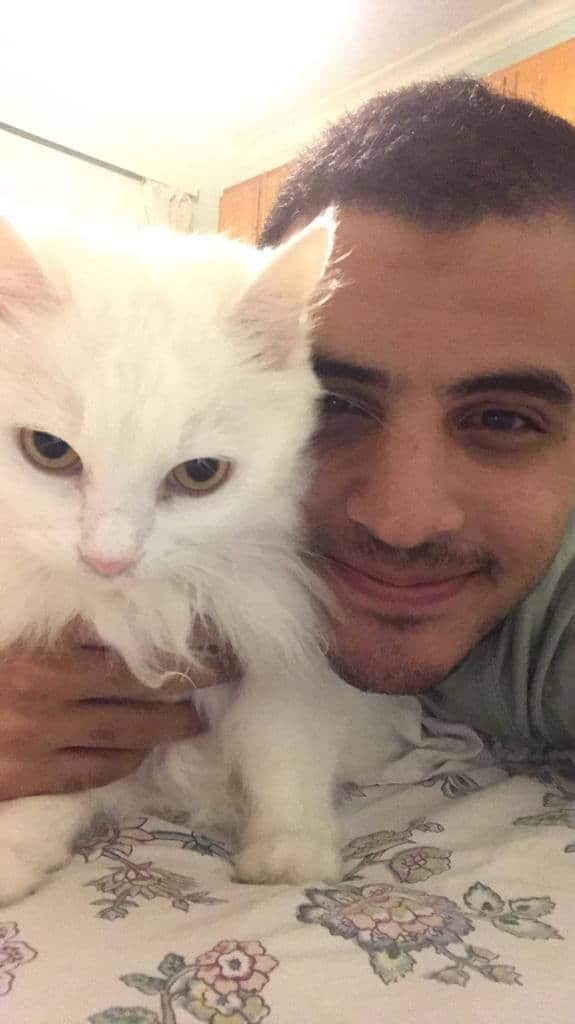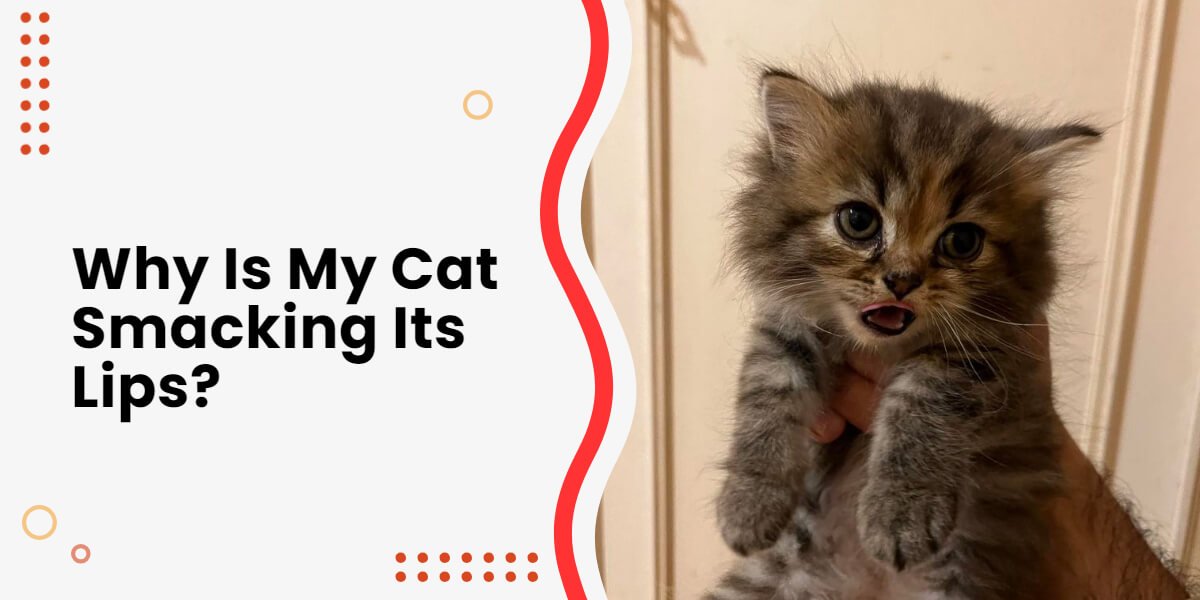Do you ever look at your cat while it’s sleeping and wonder why it’s smacking its lips? It’s cute, but is it something to worry about?
We’ll be looking into why cats smack their lips while sleeping by learning about lip-smacking and the reasons behind it. Next, we’ll learn when it’s considered normal for cats to lip-smack and when to worry. Finally, we’ll guide you on what to do as a pet parent with a lip-smacking cat.
Table of Contents
Why is my Cat Smacking its Lips While Sleeping? (and awake)
Cats smacking their lips while sleeping is a common behavior. It could simply mean that they’re dreaming! However, if they do smack their lips repetitively when awake, it could be a sign of an underlying condition.
Monitoring your pet for any behavioral or physical changes is the key to knowing why cats smack their lips while sleeping.
7 Possible reasons behind Lip-smacking
As mentioned earlier, cat lip-smacking could denote various underlying issues and causes. However, if your cat only lip-smacks while sleeping, then it’s probably dreaming! You heard right, cats can dream!
They can hiss, twitch, snore, move their paws, or smack their lips in their dreaming state. Amazing, isn’t it?
But, if a cat is smacking its lips excessively when it’s awake, you should keep an eye on it and monitor any other behavioral changes. If you notice any changes, a visit to the vet is necessary. Happy dreaming, Kitty!
Recommended: Cat’s nose dripping clear liquid while purring
1. Compulsive Disorders
Compulsive disorders in cats are when a cat engages in a series of repetitive and exaggerated acts with no apparent purpose. It could range from repetitive meowing, scratching, pacing, or lip-smacking. It can be a coping mechanism, or it can connote an underlying medical condition.
2. Displacement Behavior
Displacement behavior occurs when a cat feels conflicted between two unrelated or irrelevant behaviors or desires. For instance, a cat might want to do a certain action that it’s fearful of, such as approaching an object or another animal. But it resorts to lip-smacking or grooming instead.
Must Read: is it normal to be able to see my cat’s heartbeats?
3. Stress and anxiety
Excessive lip-smacking could be due to your cat experiencing these emotions along with other symptoms. Noticing these symptoms along with new excessive behavior, like lip-smacking, is the first step towards a stress-free kitty.
You can try using calming cat pheromones with your anxious cat, an example is Feliway Diffuser.
4. Ptyalism
Ptyalism, also known as hypersalivation, is the excessive production of saliva. There are various causes of hypersalivation, and it can be an indication of a much more serious problem. Usually, cats resort to lip-smacking to get rid of the extra drool. Ptyalism can cause nausea, vomiting, and kidney diseases.
5. Xerostomia
Xerostomia, which is also known as dry mouth syndrome, is when the production of saliva decreases. Keep watch of your cat’s gums, as this causes the cat to smack its lips and push its tongue out, to create any sort of moisture. It can be due to renal diseases or hairballs!
6. Oral and Dental Diseases
Many oral and dental diseases cause lip-smacking in cats. Examples of oral diseases are stomatitis and oral ulcers. Dental issues could entail something stuck in the cat’s teeth, plaque that later turns to tartar, gingivitis, a broken tooth, or tooth abscess.
Must Read: Why is My Pregnant Cat Calling as if in Heat?
7. Nausea and Stomach Illness
Nausea, upset stomach, or vomiting can be the reason behind excessive lip-smacking. A visit to the vet is needed for correct treatment.
Related:
– Why is My Cat Kicking its Kittens?
– How to Stop My Cat from Pulling Up The Carpet?
Other Cases Where Your Cat May Smack its Lips Excessively
Here are a few other situations or conditions that you may encounter with your cat:
do cats smack their lips when happy?
No, cats do not smack their lips as an expression of happiness. Lip-smacking is not a behavior that cats use to convey a happy emotional state.
There are several more common ways cats display happiness and contentment:
- Purring – This rumbling vocalization is one of the clearest signs of a happy, content cat. The purr originates from the larynx and diaphragm and the cat has voluntary control over it.
- Kneading – Also called “making biscuits”, this is when a cat happily kneads its paws against a soft surface or person. It originates from their instinct to knead their mother’s belly when nursing as kittens.
- Relaxed body language – A happy cat will have a relaxed posture, upright tail, eyes slightly closed, and ears positioned neutrally. They are at ease.
- Affectionate behaviors – When happy, cats may head-butt owners, rub against legs, lick hands, or sleep nearby. These displays signal bonding.
- Playfulness – A cat who playfully interacts with toys and owners is likely in a positive emotional state.
- Upright tail – Tail up signals a cat feeling pleased and optimistic.
While cats do communicate in complex ways, lip-smacking specifically has not been associated with positive emotional states in behavioral studies. Persistent lip smacking warrants veterinary assessment to address potential health issues.
Recommended: What are those black spots on my cat’s tongue?
cat smacking its lips and not eating
Here are some potential reasons a cat may be smacking its lips frequently and not eating:
- Nausea or vomiting – Cats may smack their lips repeatedly in an attempt to relieve feelings of nausea that are causing loss of appetite. Vomiting, gastroenteritis, pancreatitis, and other gastrointestinal issues can cause nausea.
- Oral pain or injury – Problems like tooth abscesses, gum disease, mouth ulcers, or foreign objects stuck in the mouth can all cause pain and lip-smacking. This often leads to decreased food intake.
- Stomatitis – This condition causes severe inflammation and ulcers in the mouth that result in significant pain, drooling, and lip motions. It frequently causes anorexia.
- Kidney disease – Poor kidney function can cause nausea, oral ulcers, and bad breath leading to decreased appetite and lip-smacking. Here’s a list of the best k/d cat food alternatives for cats with kidney conditions.
- Cancer – Some oral, neck, or gastrointestinal cancers can cause mouth discomfort, nausea, and lip-smacking that reduces food intake.
- Fever – Illnesses associated with high fevers often cause diminished appetite and increased lip licking.
- Medication side effects – Some medications may cause nausea or oral irritation that decreases appetite and leads to lip-smacking.
If the cat is not eating regularly and has persistent excessive lip motions, a veterinary visit is advised to diagnose and address the underlying medical issue appropriately. Lack of appetite and lethargy require prompt veterinary attention.
Conclusion
Your cat is continuously communicating with you through its behavior and body language. You only have to observe and take note of any changes. Cat smacking lips while sleeping could mean that your cat is dreaming about its next meal. It could denote other health problems depending on the accompanying symptoms if any. We wish your kitty a lip-smackingly, blissful sleep!

I’ve been living with cats since 2008 and I can confidently say I have more feline friends than humans lol. I currently live with 5 cats in different life stages; two of them are less than one year old, one is 2-ish years old and the oldest two are 9-ish years old. I’ve developed a strong bond with cats over the years and I’m eager to share my experience through this blog. You can learn more about my cats here.


